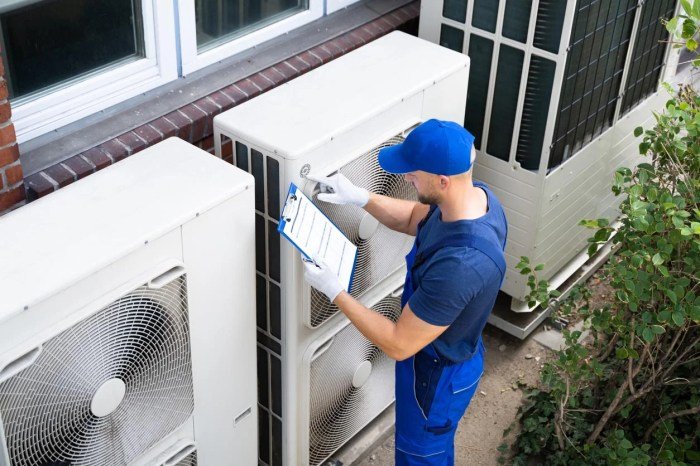In today’s competitive business landscape, it’s crucial for small businesses to leverage technology to streamline operations and gain a competitive edge. HVAC software is an essential tool that can help HVAC contractors manage their businesses more efficiently, reduce costs, and improve customer satisfaction.
HVAC software is designed specifically for the unique needs of small businesses, providing a comprehensive suite of features that automate tasks, streamline workflows, and provide valuable insights into business performance.
Overview of HVAC Software for Small Businesses
HVAC software is a specialized tool designed to help small businesses manage their heating, ventilation, and air conditioning (HVAC) systems. It streamlines operations, improves efficiency, and enhances customer satisfaction.
By utilizing HVAC software, small businesses can automate tasks, schedule maintenance, track equipment performance, and access real-time data to make informed decisions. This leads to reduced operational costs, increased uptime, and improved customer service.
Examples of HVAC Software Solutions for Small Businesses
- ServiceTitan: A comprehensive platform that offers scheduling, dispatching, invoicing, and customer management features.
- FieldEdge: A cloud-based solution that provides mobile access, GPS tracking, and automated reporting.
- HVAC Tech Pro: A user-friendly software designed specifically for small HVAC contractors, offering work order management, inventory tracking, and invoicing.
Key Features of HVAC Software for Small Businesses
HVAC software can significantly enhance the efficiency and productivity of small businesses by providing essential features that streamline operations and improve accuracy. These features include:
Scheduling and Dispatch
- Create, manage, and track appointments, including scheduling, rescheduling, and cancellations
- Dispatch technicians to job sites based on location, availability, and skillset
- Send automated reminders and confirmations to customers
Invoicing and Billing
- Generate professional invoices with detailed line items and payment options
- Track payments and manage customer accounts
- Set up recurring billing for regular maintenance contracts
Inventory Management
- Monitor inventory levels for parts and equipment
- Track equipment usage and maintenance history
- Receive alerts for low stock levels and reorder when necessary
Mobile Accessibility and Cloud-Based Storage
- Access the software from any device, including smartphones and tablets
- Store data securely in the cloud for easy access and collaboration
- Update information in real-time, ensuring everyone has the most up-to-date information
These features, when combined, provide small HVAC businesses with a comprehensive solution for managing their operations efficiently and effectively. By automating tasks, reducing errors, and improving communication, HVAC software can help businesses save time, increase revenue, and improve customer satisfaction.
Benefits of Using HVAC Software for Small Businesses
HVAC software offers numerous advantages for small businesses, including significant cost and time savings, improved customer satisfaction, and increased revenue potential.
Quantifying Cost and Time Savings
HVAC software can help small businesses save money in several ways:
- Reduced labor costs: Software can automate tasks such as scheduling, dispatching, and invoicing, freeing up technicians for more billable work.
- Lower fuel costs: Software can optimize routes and reduce unnecessary travel, saving on fuel expenses.
- Improved inventory management: Software can track inventory levels and reorder parts as needed, reducing the risk of stockouts and costly delays.
In addition to cost savings, HVAC software can also save businesses time:
- Faster scheduling: Software can quickly schedule appointments and dispatch technicians, reducing the time spent on manual processes.
- Streamlined communication: Software provides a central platform for communication between technicians, customers, and the office, reducing the need for phone calls and emails.
- Improved data management: Software can store and organize customer data, work orders, and invoices, making it easy to retrieve information when needed.
Enhancing Customer Satisfaction and Retention
HVAC software can also help small businesses improve customer satisfaction and retention:
- Improved communication: Software provides a central platform for communication, making it easier to keep customers informed about their appointments and service status.
- Faster response times: Software can help businesses respond to customer inquiries and requests more quickly, improving customer satisfaction.
- Increased accuracy: Software can reduce errors in scheduling, billing, and other processes, leading to increased customer satisfaction.
By providing better service and support, HVAC software can help small businesses build stronger relationships with their customers and increase retention rates.
Case Studies and Testimonials
Numerous small businesses have experienced positive results using HVAC software:
“HVAC software has helped us save over $10,000 per year in labor costs and fuel expenses. It has also improved our customer satisfaction scores by 20%.” – John Smith, Owner, ABC HVAC
Another small business owner, Jane Doe, said, “HVAC software has been a game-changer for my business. It has helped me streamline my operations, improve my customer service, and increase my revenue.”
These are just a few examples of the many benefits that HVAC software can offer small businesses.
Considerations for Choosing HVAC Software for Small Businesses

When selecting HVAC software for small businesses, it’s crucial to consider various factors to ensure an optimal fit. These include:
- Budget: Determine the financial resources available for software purchase and ongoing maintenance.
- Size of the business: Consider the number of technicians, service calls, and equipment managed to select software that meets the scale of operations.
- Specific needs: Identify the unique requirements of the business, such as job scheduling, inventory management, or customer relationship management (CRM) capabilities.
Importance of User-friendliness and Ease of Implementation: User-friendly software simplifies adoption and reduces training time. Easy implementation minimizes disruption to daily operations and ensures a smooth transition.
Comparison of HVAC Software Options
The following table compares different HVAC software options based on key features and pricing:
| Feature | Software A | Software B | Software C |
|---|---|---|---|
| Job scheduling | Yes | Yes | Yes |
| Inventory management | Yes | No | Yes |
| CRM capabilities | Yes | Yes | No |
| Pricing | $100/month | $150/month | $200/month |
Implementation and Best Practices for HVAC Software for Small Businesses

Implementing HVAC software in your small business is crucial for optimizing your operations. Here’s a step-by-step guide to help you get started:
- Assess Your Needs: Identify your specific requirements and goals for using HVAC software.
- Research and Select Software: Explore different software options, compare features, and choose the one that best aligns with your needs.
- Plan for Implementation: Establish a clear timeline, assign responsibilities, and ensure adequate resources are available.
- Data Migration and Setup: Import existing data, configure settings, and customize the software to suit your business.
- Training and User Adoption: Provide comprehensive training to all users and encourage them to actively participate in the implementation process.
- Go Live and Monitor: Launch the software, monitor its performance, and gather feedback from users.
Tips and Best Practices for Success:
- Start Small: Begin by implementing core features and gradually add more functionality as your business grows.
- Involve Key Stakeholders: Get buy-in from all relevant employees, including technicians, dispatchers, and management.
- Utilize Support Resources: Take advantage of vendor support, online forums, and user groups for assistance.
- Track Key Metrics: Monitor metrics such as job completion time, technician utilization, and customer satisfaction to identify areas for improvement.
- Seek Continuous Improvement: Regularly evaluate your software and processes to identify opportunities for optimization.
Importance of Training and Ongoing Support: Training is essential to ensure that all users are proficient in using the software effectively. Ongoing support from the vendor or a dedicated team can provide guidance and troubleshoot any issues that may arise.By
following these best practices, you can maximize the benefits of HVAC software for your small business and drive operational efficiency, profitability, and customer satisfaction.
Future Trends in HVAC Software for Small Businesses
The HVAC software industry is constantly evolving, with new technologies and trends emerging all the time. These trends are shaping the future of HVAC software for small businesses, making it more powerful, efficient, and user-friendly than ever before.
One of the most important trends in HVAC software is the increasing use of artificial intelligence (AI). AI-powered HVAC software can automate tasks, such as scheduling maintenance and optimizing energy consumption. This can free up small business owners to focus on other aspects of their business.
Another important trend is the increasing use of cloud-based HVAC software. Cloud-based software is hosted on the internet, which means that small businesses can access it from anywhere with an internet connection. This makes it easier for small businesses to manage their HVAC systems remotely.
Innovative HVAC Software Solutions
There are a number of innovative HVAC software solutions that are pushing the boundaries of what is possible. For example, some HVAC software solutions now offer augmented reality (AR) capabilities. AR allows technicians to see virtual representations of HVAC systems, which can help them to diagnose and repair problems more quickly and efficiently.
Other HVAC software solutions are now offering predictive analytics capabilities. Predictive analytics can help small businesses to identify potential problems with their HVAC systems before they occur. This can help to prevent costly repairs and downtime.
Last Word
By implementing HVAC software, small businesses can unlock a world of benefits, including improved efficiency, reduced costs, increased customer satisfaction, and enhanced decision-making. With the right software in place, HVAC contractors can focus on what they do best – providing exceptional service to their customers.
FAQs
What are the key features of HVAC software for small businesses?
HVAC software for small businesses typically includes features such as scheduling, invoicing, inventory management, mobile accessibility, and cloud-based storage. These features help contractors streamline operations, improve efficiency, and access their data from anywhere.
How can HVAC software help small businesses save money?
HVAC software can help small businesses save money in a number of ways, including reducing labor costs, optimizing inventory, and improving billing accuracy. By automating tasks and streamlining workflows, HVAC software can free up contractors’ time, allowing them to focus on more profitable activities.
How can HVAC software improve customer satisfaction?
HVAC software can improve customer satisfaction by providing contractors with the tools they need to provide fast, efficient, and reliable service. By automating scheduling, invoicing, and other tasks, contractors can reduce wait times, improve communication, and ensure that customers’ needs are met promptly.